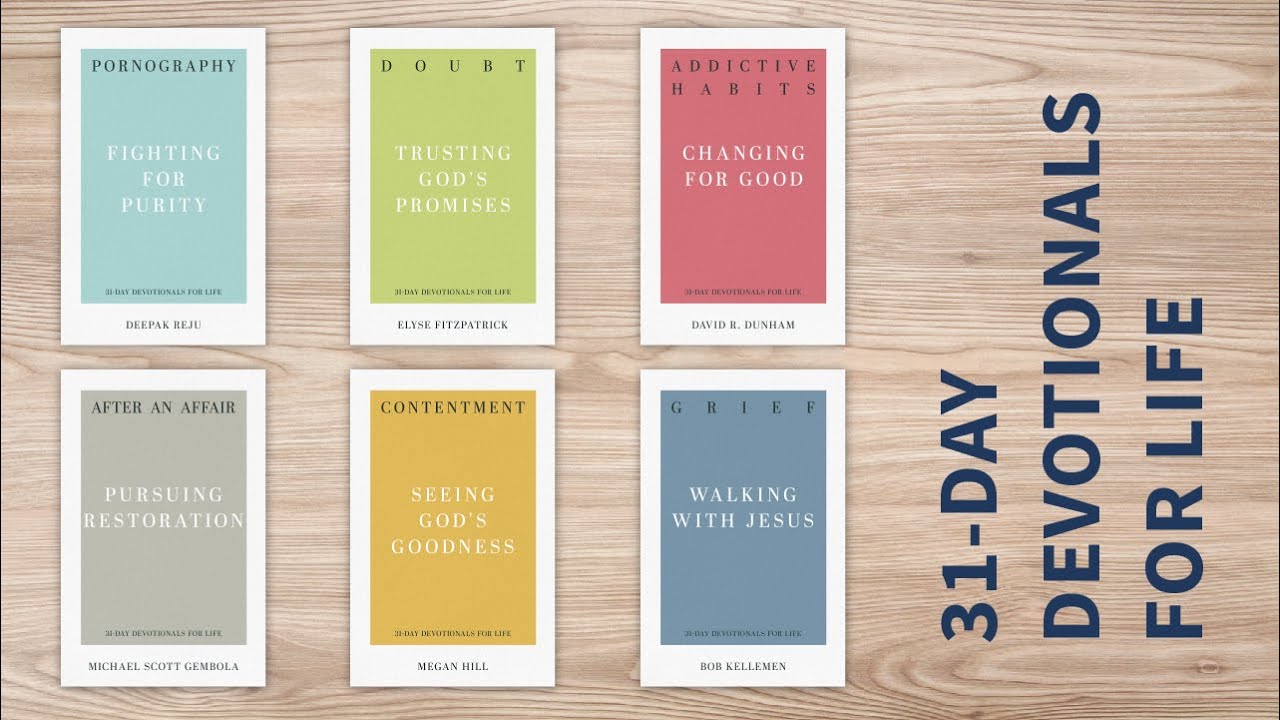|
by Pearson Johnson, Director of Student Care I wanted to take a few minutes in our blog to recommend a newer series of devotional books that have recently been published by P&R Publishers called "31-Day Devotionals for Life." This series makes a valuable contribution to the biblical counseling efforts of pastors and counselors as an additional means to help, by God's Word, strengthen those who are struggling with different life issues.
Deepak Reju, the series editor, is engaged in helping others not only as a writer and editor, but primarily as a pastor. He is an Associate Pastor at Capitol Hill Baptist Church, where he serves alongside of Mark Dever with primarily responsibility ot oversee the biblical counseling and family ministries of the church. A number of years ago, I had the privilege of talking to Deepak in his office at CHBC. He has a pastor's heart and burden to apply God's Word to the discipleship and counseling needs of church and community members. His entry in the series: Pornography: Fighting for Purity is very helpful. I am currently reviewing the devotional by David R. Dunham called Addictive Habits: Changing for Good. David is the Associate Pastor for Discipleship and Counseling at Cornerstone Baptist Church in Roseville, MI (Cornerstone is Pastored by BJU grad Bob Johnson). Dunham's main contention is that "God has much to say in his Word about addictions" (11). In each of the 31 day devotionals, a scriptural passage is given as the focus and a teaching of about two pages is provided with a point of reflection and application at the end. The devotional is designed to be a tool to accompany personal, pastoral, and counseling encouragement to help orient your thoughts and actions toward the gospel (13). Dunham divides his 31 days into four parts that form a structure for thinking about addictive habits. The first is responsibility. "Freedom begins with our willingess to accept our own role in cultivating our addictive habts" (16) . The second is relationship, reminding us that lasting change "doesn't happen simply through behavior modification," but through our relationship to Jesus Christ and his church (34). The third section, restructuring, is very practical in helping us change patterns of life to avoid and deal with the often inevitable temptations and failures that come with this struggle (53). Finally, the devotional concludes with remaining, a series of encouraging devotions on staying faithful for life (70). Dunham has structured the devotionals in a way that really helps us think biblically about the multi-faceted approach to fighting addictive habits. I concur with the way Reju describes the overall series of devotionals: "like rain filling up a bucket. It's slow and it builds over time" (9). Some of the greatest needs in a counseling relationship or personal struggle are not one-time revelations or someone with special knowledge, but the steady, personal application of God's Word through preaching, teaching, life-on-life ministry, and personal study. These "regular means of grace" remind us of truth, re-orient our minds and hearts, and redirect our path forward according to God's Word. I would recommend doing what I have done-- order a few of them for personal reading and then pass them on to those with specific needs in the areas addressed. You will find these devotionals to be very accessible, helpful and practical tools for growth and ministry. by Rachel Dahlhausen, Women's Counselor When I was a child, I always enjoyed the children’s workbook sheets that included little mazes on them. The kind where “Fido the puppy” was lost and needed help finding his way home. There were dozens of paths you could take with your pencil as you tried to lead him there, but only one that led to the center of the maze. Remember how you tried tracing your finger through the various turns and openings in the maze, hoping to discover the dead ends before you actually drew any lines, so that you didn’t make too many mistakes?
Life often feels like the maze on a child’s worksheet. Except that now you are living the ups and downs, the double backs and dead ends, and the repercussions are much greater than they were on your Sunday school handout. This year, because of the COVID crisis and the ever-changing predictions, suggestions, and mandates, it can feel like the target “home” on the maze has changed locations so many times you don’t know what to do next! I am writing this article on a day of mixed emotions because it would have been BJU’s graduation day and the closing of a semester of school. Students, congratulations! You have worked hard and done well. You have seen the Lord faithfully providing for you and enabling you to complete what you started. But as you look to do the next thing, you may find that the next thing evades you. Maybe the job you planned on working closed down. Maybe the state you live in is still under “stay at home” orders. Perhaps the summer ministry you were pumped about has had to postpone or cancel plans. You look at your google calendar and it stretches as empty and white as the Sahara desert. And it’s hard. Friend, it’s ok for it to be hard. The Lord told us that we would have tribulation in this world, and He sorrows with us in it. But what are you going to do with that sorrow? How are you responding to all the changes and uncertainties? What are you believing about God, about yourself, and about your circumstances? Here are two things I’ve tried to preach to myself. First, remember God and His providence. God’s providence is beautifully described in the Westminster Catechism as “His most holy, wise, and powerful preserving and governing of all His creatures and all their actions.” God is unchanging in every one of His perfect attributes (Mal. 3:6). God has not left me or forsaken me (Heb. 13:5). God has not been taken by surprise in this worldwide calamity; rather, He brought it (Amos 3:6). God’s ways are far higher and better than mine (Is. 55:9). He is the Rock upon which we can build our lives (Matt. 7:24-27). God promises to work good for those who love Him, even when sinful men attempt otherwise (Gen. 50:20). God’s providence, rightly understood, is one of the greatest comforts of a believer’s life. Try reading Psalm 139 with God’s providence in mind. As the puritan writer John Flavel wrote, “One word of God can do more than ten thousand words of men to relieve a distressed soul.” Read Trusting God by Jerry Bridges or The Mystery of Divine Providence by John Flavel. It will be time well spent; I assure you! By faith believe that God is wisely directing in every situation. Secondly, remember the big picture of God’s will for you this summer. We can get so caught up in “what is God’s will for me” questions as we consider where to work or live or what to do or who to marry. While the Bible does teach us that God has a specific plan for us, many of the verses of Scripture that refer to God’s will are focused on WHO we are rather than WHERE we are. For instance, 1 Thessalonians makes two direct references to God’s will. The first says, “For this is the will of God, your sanctification; that you abstain from all sexual immorality…” (1 Thess 4:3). The word sanctification is referring to living a holy life, a life that is more and more transformed to look like Jesus. Are you growing spiritually? Are you letting the beauty of Jesus’ face into your life through daily time in the Word (2 Cor. 3:18)? Are you praising and pouring your heart out to the One who bore all your griefs and who sits interceding before the throne for you (Rom. 8:34)? Are you putting sin to death in your life by abstaining from all forms of sexual immorality…movies or reading material or pornography or fantasy? This is God’s will for you! The second reference to God’s will in 1 Thessalonians is full of absolutes: “Rejoice always, pray without ceasing, give thanks in all circumstances; for this is the will of God in Christ Jesus for you” (1 Thess. 5:16-18). This admonition is immediately convicting to me. “Give thanks in all circumstances.” COVID-19 is a circumstance in my life. Summer uncertainty is a circumstance in my life. Cancelled vacation plans are a circumstance in my life. These are circumstances I didn’t choose and didn’t want. But in God’s good providence, they are in my life. Will I please Him by, in the power of the Holy Spirit, doing what 1 Thessalonians 5:16-18 says? If I obey in this way, I am absolutely living God’s will out for my life today! I am honoring Him today. I am fulfilling His purpose for me today. And there is comfort in that. The Heidelberg catechism, after defining God’s providence, asks an insightful second question: “What is the benefit of our knowing about God’s providence?” The answer, if you will take time to digest it, is precious. “The benefit of our knowing about God’s providence is that it makes us patient in adversity and thankful in prosperity, so that we may place our firm trust in our Heavenly Father concerning everything that befalls us.” Patient in adversity and thankful in prosperity. Firm trust in our Heavenly Father. I don’t respond that way nearly as often as I should, but I am learning to do so by God’s grace! As my pastor Mark Minnick said in a recent sermon, “There is something for you to pray today. There is something for you to say today. There is something for you to think today that will glorify God. Please the Lord with your steadiness, your firm conviction about the future.” So turn away from Netflix binging and all-night social media scrolling or endless, mind-numbing worry, and in God’s wise providence, live out what you know is His will for you today! by Matthew Weathers An empty inbox at the expense of an empty prayer closet is a terrible trade off.” –Garrett Kell These words hit me like a ton of bricks when I read them last week. I am someone who pursues an empty inbox and enjoys accomplishing tasks throughout the day. This quote was a helpful and convicting reminder that an empty inbox and a completed check-list do not constitute a truly productive day. There are countless needs in the world – from wiping the nose of a sick child, doing the laundry, changing the oil in the car, and responding to emails, to feeding the hungry, caring for the hurting, and sharing the gospel with the lost. Yet our days our numbered. What should we do? Concerning outreach, Jesus beckons his followers to consider the needs, to have compassion, and then to pray earnestly. When he saw the crowds, he had compassion for them, because "they were harassed and helpless, like sheep without a shepherd." Then he said to his disciples, “The harvest is plentiful, but the laborers are few; therefore pray earnestly to the Lord of the harvest to send out laborers into his harvest” (Matthew 9:35-38). Jesus taught that earnest prayer must precede reaping from the plentiful harvest. We must abide in His presence before we can abound with His produce. Roots before fruits. Concerning other needs, Paul instructs believers to bring their needs to God in prayer (Phil. 4) and to continue in prayer (I Thess. 5). Prayer is a priority to productivity because true productivity is not just getting things done but getting the right things done for God’s glory. And for that we all need wisdom and strength. Prayer is not a magic potion that ensures wonderful things will happen the rest of the day. God is not your genie. Prayer is time well-spent in the presence of God. It is simple and ongoing communication with Him directed by the truth of His Word and the delights and desires of our hearts. (As an aside, I highly recommend A Praying Life by Paul Miller.) Jesus himself perfectly modeled the balance of praying and working, which is really to say praying while working. And while we certainly aren’t perfect, we can seek to increasingly make prayerful productivity a priority each day “It doesn’t matter how efficient you are if you are doing the wrong things in the first place.” -Matt Perman, What’s Best Next by Ben Peeler, Resident Mentor "Let us hold fast the confession of our hope without wavering, for He who promised is faithful. And let us consider how to stir one another to love and good works, not neglecting to meet together, as is the habit of some, but encouraging one another, and all the more as you see the Day drawing near." (Hebrews 10:23-25)
I'm not sure how much this passage has occurred to you during these times, but it was brought to my attention recently that our church may be disobeying this clear command. Was I missing something in understand this passage in light of the current restrictions from assembling surrounding the Coronavirus? First, we need to look at this original audience. The writer of Hebrews addressed this letter to Messianic Jews scattered throughout the Roman Empire who were battling temptations to return to Judaism. Because of the particular social, political, and religious pressures they faced, these young Christians needed a strong reminder that Jesus was better than everything else. For these Christians, at best facing social prejudice, and at worst physical torture/ death, they desperately needed each other! We have to understand commands and instructions in the way they were intended to be taken, and not pull them out of context as proof texts. The writer of Hebrews was addressing men and women whose great temptation was to turn their backs on Jesus and return to the yoke of bondage (as Paul called it in Galatians). They needed one another, as Christians today do too. Those believers who patterned their lives by not associating with other Christians, but rather distanced themselves from the body were not just hurting themselves but hurting others and disobeying God. This brings us to the issue of what we should do today in light of the Coronavirus. Churches have not met for close to 6 weeks now and this command in Hebrews seems to be more and more relevant. But should it be? Are we Christians willingly neglecting to meet together? Are we living our lives as if God and His Church didn't exist? I think for most of us, that is very far from the truth. Still, this time should cause us as Christians to take inventory of our lives before things were put on hold. How faithful were we to our assembly before the Coronavirus? How valuable was Jesus' church to us before we were "forbidden" from attending? For some of us, our attendance wasn't what it should be. Of course, if you were totally committed to gathering, then praise be to God! But we can all use this time to reset our priorities and re-center our entire lives around what truly matters: Christ and His church. The writer of Hebrews added a purpose behind meeting together-- ministry to one another. He wrote that we are to "stir one another to love and good works." Even though we cannot assemble, we can still accomplish some of our duty through the wonder of technology. Are we taking advantage of the venues our church is offering to connect? We should be! This is a time to draw close to one another whenever possible, not pull apart. While it may be the habit of some to neglect assembly with and ministry to the body, may it never be said of us! Christ's commands are still in effect. We live in unique times, and Romans 13 gives us clear commands about respecting governing authorities. So, while we may need to suspend assembling, we can still move forward in ministry and obey Christ. Love God. Love His Church. Be all in when this time of sickness has passed and even now! by Matt Bohin, Residence Hall Supervisor  We are a people often laden with anxiety, worry, fear, and depression. At times like these our sins and struggles become more magnified than we ever thought possible. Perhaps as you read this you’ve wrestled with wave upon wave of fear or depression stemming from the world’s circumstances. You may even know people who are wondering where to look for help. One of the most helpful books I’ve read on dealing with these issues is God is More than Enough by BJU’s very own Dr. Jim Berg. In it, Dr. Berg seeks to unmask the underlying causes of anxiety, guilt, anger, and depression. Ultimately, a proper belief in God quiets the noisy soul. If you’ve never read the book, Dr. Berg graciously explains how people come to points of utter despair, anger, or worry. He concludes that “unbelief” is “the mother sin- it gives birth to all the others” (36). At the heart of our struggles is a fantasy world where God isn’t at the center. Dr. Berg then explains how God’s glorious attributes combat unbelief and its effects. He points us to God’s love, mercy, faithfulness, power, and wisdom as stabilizing principles which ease the noise of anxiety, anger, guilt, and depression. Why do I like this book so much? Here are three reasons:
So, if you need a resource to help with increasing despair, anxiety, guilt, or anger, take a look at God is More than Enough. by Rachel Dahlhausen, Women's Counselor Living back at home with family, particularly during a stay-at-home order, brings out the good, the bad, and the ugly in us and in those around us. I grew up in a wonderful Christian home. Still, as a college student, I remember the frustrated, sick feeling I would get after what seemed like every interaction I had with one of my siblings. No matter how a conversation started, it felt like it always ended in an argument. I began to dread sitting together at meals because of the “inevitable” conflict that would ensue. Bitterness started to creep into my heart like the Kudzu vines in the South, slowly eating away at the good and turning the whole relationship into something tangled and brown.
Conflict can look like arguments and yelling. It can look like silent treatment and avoidance. It can, sadly, even look like physical abuse or cruelty. Certainly, if your situation is unsafe in any way because of other’s sin against you, please reach out immediately for help from civil authorities, a godly pastor, and a biblical counselor. Maybe you are trying to navigate life in a house filled with verbal time bombs, or maybe you are ashamed of the harsh words and fierce anger of your own heart towards someone you love. Whether you live in a home where Christ is honored or where you are the only Christian, we all need help and hope from God regarding how to handle conflict. There is much that the Scripture gives to guide us, but today we will focus on three foundational principles. 1. Acknowledge the Real Source of Conflict James 4:1 says, “What causes quarrels and what causes fights among you? Is it not this, that your passions are at war within you?” The Bible teaches us that conflict comes from the passions of our own hearts. Other people can live selfishly or speak unkindly, and God will hold them accountable for their behavior, but we are responsible from what comes out of us in response. We sin because we are self-centered and want our own way. Jesus said that it is what comes out of one’s heart that defiles a person (Mk. 7:15). Conflict usually arises because I am not getting to rule my “kingdom” the way I want to. I want things to go my way! I must acknowledge my sin in a conflict and be willing to humbly confess it as sin and turn to God in repentance. I must repent of my ruling passions, the heart desires that fuel the conflict in my life. 2. Remember Your Christ and Your New Identity By faith I look to Christ. I remember His work on the cross and His full forgiveness for every sin. I rehearse how I am now “in Christ”, a phrase used over seventy-five times in the Bible! To be “in Him” means I have received every spiritual blessing (Eph. 1:3). I am forgiven. I am loved. I am empowered. I am accepted. I am set apart for God. I am no longer a slave to sin (Rom. 6:4). I now live for my created purpose—to worship God and enjoy Him forever (1 Cor. 10:31). I am living, not for my kingdom, but for God’s kingdom (Matt. 6:33). 3. Overcome Evil with Good The passage God used most to change my heart in relationship to my family member was Romans 12:16-21. “Live in harmony with one another. Do not be haughty, but associate with the lowly. Never be wise in your own sight. Repay no one evil for evil, but give thought to do what is honorable in the sight of all. If possible, so far as it depends on you, live peaceably with all…Do not be overcome by evil, but overcome evil with good.” Romans 12 comes after powerful passages earlier in the book that talk about salvation, justification (being declared righteous before God), and sanctification (growing in looking more like God). Because of what God has done, I am able to live free from sin and alive to God. I kill my old responses and in the power of the Spirit I live out new ones. That looks like living in harmony. It looks like, as much as is possible, living peaceably. And it looks like overcoming evil with good. Overcoming evil with good. How difficult that is! How absolutely contrary to my nature! How undeserved by the other person in the conflict! But God displayed the ultimate example of this when He gave His Son, Jesus Christ, to die on a cross for your sin and my sin. My evil was overcome by His good. Try and picture Jesus, the rabbi who healed the lepers and who loved the children, gasping for breath as His tortured body hung suspended by nails. Greater still was His anguish of spirit as God the Father poured out His wrath for the sins of the world upon His beloved Son. Yet as Jesus hung there, He cried out, “Father, forgive them, for they know not what they do.” God offered forgiveness while we were still sinners. All the evil in the world cannot overcome the good that God brought from the death, burial, and resurrection of Jesus! Though we may not see what good will result from our humility and forgiveness in relationship to others, we can be confident that God’s purposes are good and trustworthy. So how do we overcome evil with good? If we are called to love our enemies, we are most certainly called to love our family. What good can you do for those in your family today?
Because we are deeply loved children of God, let’s imitate Christ when conflict arises. “Blessed are the peacemakers, for they will be called children of God” (Matt. 5:9). by Matthew Weathers Good Reads on Leadership
We find ourselves in a very unusual time. Our lives have been disrupted and we face daily uncertainties. At times like these we realize afresh the importance of leadership and perhaps we have a bit of extra time to read good books! J. Oswald Sanders said that “discipline in early life, which is prepared to make sacrifices in order to gain adequate preparation for the life-task, paves the way for high achievement.” I encourage you to utilize the time to expand your knowledge base about leadership. Here are four books that deal with leading yourself and leading others that I found compelling and helpful.
"Leadership matters. Your leadership matters. A good leader changes the course of organizations, entire industries, states, countries, and even the global landscape.” -Burnett by Matthew Bohin, Men's Residence Hall Supervisor We read a very insightful prayer in Psalm 90:12. Moses writes, “So teach us to number our days so that we may get a heart of wisdom.” The Lord calls each of us to wisely and carefully use the time he allots.
If you’re a normal human being, I think you can spot the problem. How do we use the time God has allowed when we’ve done every possible thing we can think of? By this time in your Coronavirus isolation, you’ve probably played monopoly more times than you’d like to admit, scrolled endlessly through social media sites countless times per day, and have had more family time this week than you had all of February combined. What should you do with all this time? Before giving some suggestions, let me point you to a resource which I’ve found immensely helpful for organizing my time. The book is entitled Do More Better by Tim Challies. On his website, you’ll find a section of free “Bonus Material” which provides helpful worksheets for godly productivity. You’ll find some of his thinking in my suggestions below: So, what should you do with all your free time? Here are four practical suggestions:
On rare occasions in life, God opens up massive amounts of free time for us to use for his glory. Number your days by planning to use the time for his glory! |
AuthorSBlog posts are authored by the Student Development and Student Care & Discipleship Staff of Bob Jones University Archives
May 2020
Categories |









 RSS Feed
RSS Feed